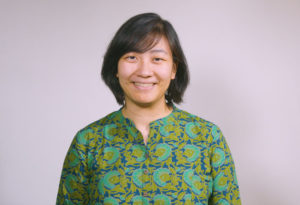Ever thought that menstruation could lead to a plastic pollution problem? or even be part of the circular economy?
In India, only 36% of women have access to sanitary pads. A lot of the population lives in rural areas and distribution is therefore very difficult. Kristin Kagetsu, one of the co-founders of Saathi, came together with two other friends (Tarun Bothra and Grace Kane) on a mission to create fully eco-friendly, compostable sanitary pads using locally sourced banana fiber from the state of Gujarat, where Saathi is based.
They want to improve women’s access to sanitary pads in India while also offering positive impacts on health, the community, and the environment. They address 8 of the UN Sustainable Development Goals by empowering local communities via a local supply chain, giving girls and women access to safe feminine hygiene products, and finding a solution for upcycling pads into compost, biomass, and electricity to reduce carbon emissions and plastic waste.
In this talk, we would like to discuss the issue of period poverty in India, what sustainable menstruation is and how it leads to a circular economy and a more holistic model of sustainable manufacturing. In a sustainable manufacturing process, the entire process from production to distribution reduces waste and is careful to ensure the use of eco-friendly raw materials.

Kristin Kagetsu – Co-founder & CEO, Saathi Pads
Kristin holds a BS in Mechanical Engineering from MIT. Since high school, she has been passionate about empowering girls and women to make a difference and to take an interest in science and engineering. At Saathi, she is able to combine these two passions by providing women a safer and healthier alternative to plastic and chemical-filled pads and supporting an all-women staff in the manufacturing unit. Since its founding, Saathi has been recognized globally by Time Magazine, Fast Company, UNDP, UN Environment Program, UNIDO, UNESCO, Cartier Women’s Initiative Awards, the University of St Andrews, MIT, Harvard Business School, Allure, Vogue, and others, for its social impact, innovation and sustainability.
Prior to co-founding Saathi, where she serves as chief executive officer, Kristin worked as a Hardware Engineer designing data servers for a large tech company in the US and as the Collegiate Program Manager for the Society of Asian Scientists and Engineers. Prior to that, she spent a year working with a local NGO in Uttarakhand, India to develop natural dye crayons from waste materials as an extension of a project from an MIT D-Lab fieldwork trip to India.

The Green Leadership Impact Heroes series is a partnership between Bridge and Earth Company.
Earth Company’s flagship program, Impact Heroes, selects an exceptional change-maker in the Asia Pacific who has the potential to realize social change for future generations. Impact Heroes receive customized three-year support including funding ($>100k), marketing support, and coaching to maximize their impact and potential as leaders. In addition to one Impact Hero, Earth Company works with a cohort of changemakers every year as part of an empowerment program.
Register on Zoom
Meeting ID: 986 5886 9386
Passcode: 740175



